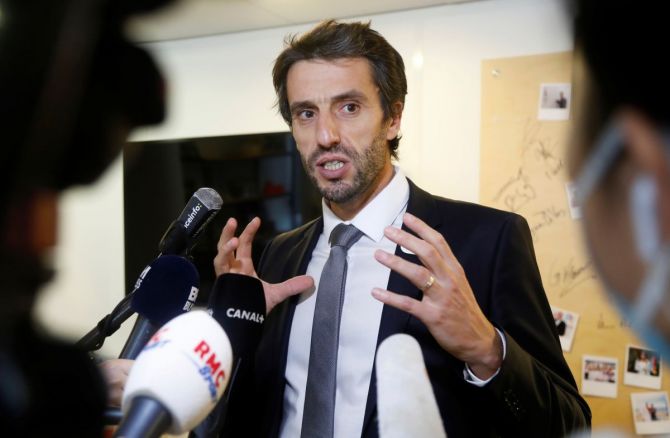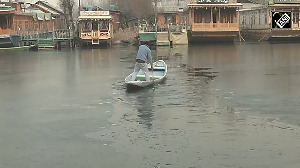E-sports and breakdancing will debut in the 2022 Asian Games in Hangzhou, China, as full medal sports after being approved by the Olympic Council of Asia (OCA), the governing body said on Friday.
E-sports first appeared as an official medal sport at the Asian Indoor Games in Macau in 2007. They were also a part of the 2018 Asian Games in Indonesia but medals did not count in the overall standings.
"I hope that electronic sports will add value to the Asian Games -- and I am sure it will in the future, during the Asian Games 2022 and even beyond that," said OCA Asian Games Director Haider Farman.
Breakdancing, considered one of the pillars of hip-hop culture, will also make its Asian Games bow in 2022, two years before it features in the Olympics for the first time in Paris.
The 19th edition of the Asian Games is due to take place from September 10-25, 2022.
Breakdancing included in Paris 2024 to reach out to youth: Games Chief

The inclusion of breakdancing at the 2024 Olympics may been surprising but organisers were drawn to the sport's potential to attract a younger fanbase and grow the Olympic audience in the internet age, Paris Games chief Tony Estanguet said.
Breakdancing was one of four new sports to win a spot at the Games in Paris -- alongside surfing, skateboarding and sports climbing -- after the International Olympic Committee ratified their inclusion earlier this month.
Estanguet added that though the decision to add breakdancing to the Games roster had come in for some criticism, most of the feedback he had received had been overwhelmingly positive.
"What attracted us to this sport was its ability to attract the youth," he told Reuters in an interview. "It's a sport that is widely watched on all digital platforms, widely consumed by young people.
"It's very impressive technically and physically, what these athletes manage to do, and that's why we were attracted to this sport. The feedback has been very good.
"There are always a few critics, but overall... I see that throughout the different regions of France, there is very positive feedback on the addition of breakdance as a new sport."
Games' organisers had been on the hunt for new sports to broaden the appeal of the Olympics and breakdancing fit the bill because it had already been part of the programme at the Youth Olympics in Buenos Aires in 2018, he added.
"We found climbing, skateboarding, surfing and breakdance, and we are really adding events that come from a completely different world, with fans, who would not necessarily be connected to the Olympic Games otherwise," Estanguet said.
"This allows us to expand the number of fans and viewers."
The 2020 Games in Tokyo were postponed to 2021 due to the COVID-19 pandemic and public opinion on whether the event should go ahead is mixed, with 60% of respondents in a November poll saying the Tokyo Games should be postponed further or cancelled.
Estanguet said there are no such reservations about the 2024 Olympics in France.
"What is a matter of public opinion in Tokyo is specific to Tokyo," he added.
"We carried out a survey this week which shows that in France, Paris 2024 continues to receive wide support from the French."
Russia relieved after Olympic doping ban shortened
The Kremlin said on Friday it regretted Russia was unable to avoid doping sanctions but some officials declared a small victory after sport's highest court halved a ban on athletes competing at the Olympics under the Russian flag to two years.
The decision, announced by the Lausanne-based Court of Arbitration for Sport (CAS) on Thursday, softened sanctions issued by global anti-doping authorities in response to Moscow intentionally providing it with doctored laboratory data that could have identified drug cheats, something it denies.
The Kremlin said it was good that the ruling, which some foreign sports officials have said was not tough enough given Russia's doping offences, allows some Russian athletes to compete at the world's most prestigious sporting events.
CAS said the decision means Russians who are not suspended have a chance to compete in the Olympics and world championships as neutrals – without the Russian flag on their uniform and without the country’s anthem sung at official venues.
"Of course we regret this (overall ruling), we view it negatively," Kremlin spokesman Dmitry Peskov said. "But at the same time, the main thing is that athletes are getting the right to take part in competitions" as neutral competitors.
The World Anti-Doping Agency (WADA) said the measures were "the strongest set of consequences ever imposed on any country for doping-related offences."
Russian officials, despite their disappointment at more sanctions, focused on the fact that the decision was not worse.
"The outcome today is a victory for Russia," Mikhail Bukhanov, acting director of Russian anti-doping agency RUSADA, said on Thursday.
"CAS did not restrict clean athletes' right to compete at the Olympic and Paralympic Games, as well as at world championships."
Sports Minister Oleg Matytsin said it was "positive" that the sanctions would only last until December 2022, instead of four years.
The ruling leaves Russian athletes without their flag and national anthem at next year's Tokyo Olympics, the 2022 Beijing Winter Olympics and at the 2022 soccer World Cup in Qatar.
Russian officials fumed that the sanctions bar them from attending the Olympics and other major events for two years.
They cannot be appointed to or sit on committees or serve as board members at organisations that must abide by the WADA code during that period.
"It's not right to say the least to extend the sanctions action to cover civil servants," RIA news agency quoted Matytsin as saying.
The sanctions do not apply to a government official invited to attend a major sporting event by a foreign head of state.
"This is just one other dark outcome in a long 10-plus year effort for the Russians to corrupt sport, to cover it up and essentially get away with it," Travis Tygart, CEO of the United States Anti-Doping Agency (USADA), told Reuters.
"And let's not forget this slap on the wrist, a light slap on the wrist, was exactly what happened (at the 2018 Winter Olympics) in Pyeongchang."
Many Russian athletes were sidelined at the past two Olympics and the country was deprived of its flag for the Pyeongchang Games as punishment for state-sponsored doping at the 2014 Sochi Games in southern Russia.
Russia, which has in the past acknowledged some shortcomings in its implementation of anti-doping policies, denies running a state-sponsored doping programme.
Canoeing, taekwondo, modern pentathlon earn 2023 European Games spots
Canoeing, taekwondo and modern pentathlon won a spot at the Krakow-Malopolska 2023 European Games after the European Olympic Committees ratified their inclusion on Friday.
The inclusion of these three sports in the third edition of the Games will offer qualification opportunities for athletes ahead of the Paris 2024 Olympics.
Canoe slalom and modern pentathalon will make their debuts at the European Games, while it will be a second appearance for taekwondo which featured as part of the programme in Baku 2015.
The European Games are expected to be held in June 2023.














 © 2025 Rediff.com -
© 2025 Rediff.com -